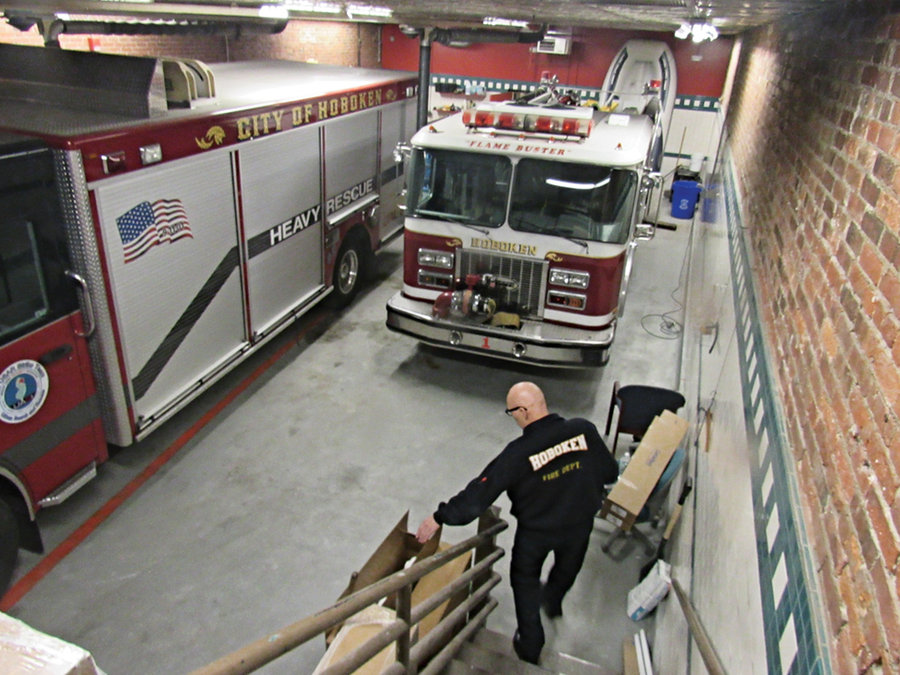While water is a blessing to help firefighters fight blazes, water from heavy rains and aging pipes has made life difficult for firefighters in Hoboken.
Hoboken’s firemen and women are beginning to see major upgrades to their fire houses, which Fire Chief Anton Peskens says have been riddled with water problems for years.
Superstorm Sandy devastated Hoboken in October 2012. But it wasn’t until last August that Peskens discovered three feet of water in the basements of both uptown fire houses. Peskens said those portions of the basements are not commonly accessed and it should not have taken so long to find the flooding. The buildings have since been pumped out, he said, with no health problems resulting.
But more help is needed.
The new fire chief says generators are being installed at all the fire houses and will be elevated 12 feet off the ground so they won’t be damaged by floods. Improvements to roofing and equipment are also in the works.
The city operates firehouses at 201 Jefferson St. (headquarters), 43 Madison St., 801 Clinton St., and 1313 Washington St.
The department, which is celebrating its 125th anniversary on June 1, has 111 firefighters and a fleet of six vehicles.
Uptown fire house temporarily closed
The Washington Street fire house, one of four in the city, has been closed for less than a month, Peskens said, as repairs are done.
“We didn’t shut the apparatus down,” he clarified. “We took fire trucks that work in this fire house, put one at Eighth and Clinton and the other at Second and Jefferson Streets. Response times are a little bit affected, but we unfortunately had to do it out of necessity.”
The last time the Washington Street fire house was renovated, Peskens said, was in the late 1980s.
Last July, roughly $240,000 was awarded for roof replacement, flooring repairs due to age and water damage, interior brickwork, and replacement of other furnishings.
“We’re not losing city blocks anymore because of early detection, smoke alarms in every building, and sprinkler systems.” – Anton Peskens
____________
And recently, a new $600,000 fire apparatus – an E-One Cyclone II – was purchased.
The department’s vehicles helped comb the flooded streets of Hoboken during Superstorm Sandy. Peskens hopes to retire additional trucks in exchange for newer rescue vehicles.
Water main breaks are big concerns
A major problem for the department recently was two water main breaks. These were the most harrowing problem Peskens has had to deal with since taking over as chief, he said during a walkthrough of the uptown fire house.
“We physically lost water in Hoboken for six to ten hours,” said Peskens. “At the time we thought ‘No one’s going to die of thirst,’ but we may lose a city block if we don’t have water [to fight fires].”
The city had to cope with two water main breaks in a single week around Thanksgiving Day, which came as no surprise for longtime residents who know the city’s long history of problems with its aging water systems.
The south and west sections of town, most of which are below the water level of the Hudson River, regularly flood during high tides and heavy rains.
Peskens said Suez Water and the city’s Office of Emergency Management got the department back on track fast. He had similar praise for the Zimmer administration on the upgrades he has identified recently as necessary.
“I’m getting nothing but cooperation from City Hall on our improvements,” he said.
On the job
Peskens joined the Fire Department in 1986. Prior to becoming chief he served as Battalion Chief starting in 2011.
No one perished in a fire last year – civilian or firefighter. Since 2010, there have been approximately four fire-related deaths in the city, Peskens said.
“We’re not losing city blocks anymore. [It’s] because of early detection, smoke alarms in every building, and sprinkler systems,” he said.
Peskens says the calls the department receives vary from serious two-alarm fires to someone getting stuck in an elevator. In the summer, the department rescued a litter of kittens from the wall of a 13th Street garage.
Other typical calls for the department: lockouts, “careless cooking,” road kill, trucks hitting electrical wires, carbon monoxide and gas leaks, and, yes, animals in trees.
Steven Rodas can be reached at srodas@hudsonreporter.com.
